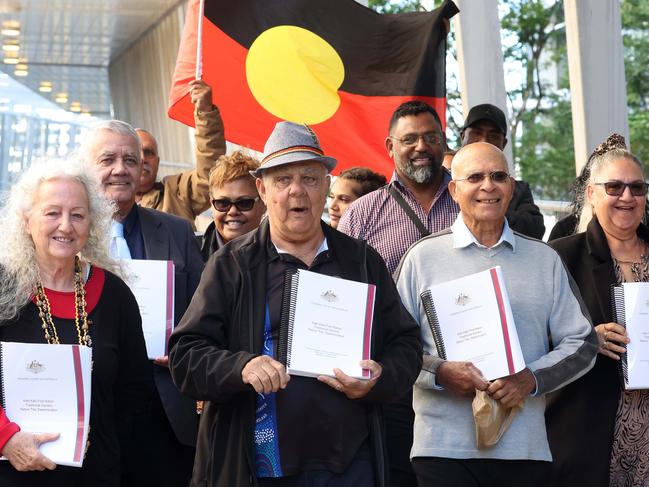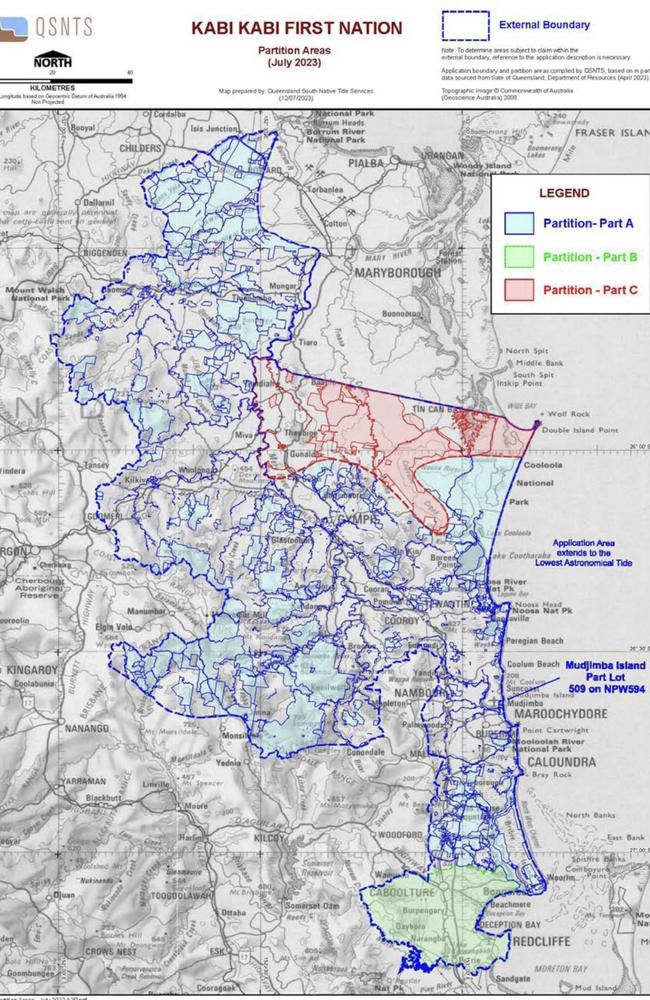‘For any purpose’: Landmark Sunshine Coast native title ruling grants new rights to Kabi Kabi people
A massive native title decision covering 365,000 hectares in Queensland has granted the traditional owners the right to “take resources from the area for any purpose”.
A massive native title decision covering 365,000 hectares of the Sunshine Coast has granted the traditional owners the right to “take resources from the area for any purpose” in a first for southeast Queensland.
The Kabi Kabi people have been formally recognised as the native title holders over a huge section of land and waters stretching from Elimbah Creek, Sandstone Point and Bribie Island in the south, Cooloola National Park, Curra State Forest, Mary River and the Isis River in the north, and from the coastline west to Nambour, Jimna and the Burnett and Coast Ranges.
The 12,000 square kilometre determination area also encompasses tourist hotspots Noosa, Gympie, Mudjimba Island, Maroochydore and Caloundra, marking the first time native title has been granted over heavily urbanised areas on Australia’s east coast.
At a special hearing in Brisbane on Monday on the claim, initially filed in 2013, Justice Berna Collier said she was satisfied the group “have and always have had native title rights and interests in this country” and had maintained ties with the land since before European settlement.
“I congratulate everyone involved for reaching agreement in this matter, but in particular the Kabi Kabi people whose native title rights and interests have today received deserved recognition,” she said.

Norman Bond, a Kabi Kabi traditional owner, said the ruling meant “stability and grounding to build the Kabi Kabi nation where it should be”.
“It means the Kabi Kabi people can be formally recognised by all tiers of government and by the public without feeling they have to justify who they are, because the native title claim process was not complete,” Mr Bond told The Courier-Mail.
The ruling grants the Kabi Kabi people non-exclusive rights to hunt and camp, take and use water for non-commercial purposes, bury their dead, participate in cultural activities, maintain places of importance under their laws and customs and “protect those places and areas from physical harm”, teach about the physical and spiritual attributes of the area, hold meetings and light fires “but not for the purposes of hunting or clearing vegetation”.
It also grants them the right to “take resources of the area for any purpose”, whereas previous native title determinations in the region were limited to personal, communal and non-commercial purposes. This does not include minerals or petroleum.
Justice Collier also noted her ruling does not confer “possession, occupation, use or enjoyment to the exclusion of all others, including other interests as defined in the judgement and which continue to have effect”, meaning the Kabi Kabi people cannot control access or use of the area.
One Nation Senator Malcolm Roberts slammed the decision.
“Two hundred and twenty kilometres from top to bottom, stretching from Bribie Island all the way up to Childers,” he wrote on X. “When will this end?”

But prominent native title lawyer Richard Abraham from law firm MinterEllison said fiery public debate over the issue was clouded by “a lack of understanding”.
“There’s a lack of understanding over what native title actually is and out of that comes unnecessary levels of fear,” he told The Courier-Mail.
“The reality is if it hasn’t impacted your life to date, it’s not going to affect you the day after a court decision. There have been hundreds of native title rulings across the country and it’s only when they are close to urban areas that we see a certain level of fear and alarmist behaviour.”
Queensland Premier Steven Miles assured the public the ruling would not impact freehold land.
“The Kabi Kabi people have said they want people to continue to enjoy what makes the Sunshine Coast great — the Glass House Mountains, Mount Coolum, the beaches,” he said on Monday.
“I don’t think there’s anything here to be concerned about. If anything, it’s just an opportunity for us to better understand, better integrate those First Nations’ stories into our understanding of the land.”
However national parks, climbing spots and tourist destinations have increasingly been closed to the general public on cultural heritage grounds.
Restrictions have already been proposed on three summits in the Glass House Mountains, including Mount Beerwah, as well as Lake Eyre in South Australia, now known as Lake Eyre/Kati Thanda. In NSW, the four-year closure of Mount Warning in the Northern Rivers region’s Wollumbin National Park has also been a long-simmering controversy.

According to the Queensland South Native Title Services, Monday’s Kabi Kabi determination effectively means that an Indigenous group can’t tell the public to “get off the land”.
This has posed an issue in the past, as disputes have flared up in Burrum Heads near Hervey Bay since last year.
Another Indigenous group to have native title rights recognised is the Butchulla people, who hold it around Hervey Bay and Fraser Island, also known as K’Gari.
They were granted almost 100,000 hectares of native title land on the Fraser Coast in 2019, which includes 17,000 hectares of exclusive use.
A small group of Butchulla people had established a camp near the idyllic beach and were chasing away residents, which the Butchulla Native Title Aboriginal Corporation (BNTAC) stated that they were using it without proper authorisation.
The BNTAC have criticised the group and their actions, stating that there was a way for “all to enjoy this beautiful country”.
At the time of the incident, federal MP Keith Pitt argued that the best solution for the conflict was for the small stretch near the beach to be removed from the exclusive use ruling.
Mr Pitt told The Daily Mail last year that his office had been inundated by “concerned Burrum Heads residents” who “contacted my office about an area of land under native title”. “It has resulted in restricted access to the beach and older constituents being chased off the beach,” he said.
“Every Australian is expected to abide by Australian laws and regulations, without exception.”

Despite the historic ruling taking place in their favour, Kabi Kabi traditional owner Kerry Jones said it has “taken longer than I thought”.
“My family have never left country, and we have always looked after and fought for the environment and all our rivers for generations and still do today,” he told The Courier-Mail. “Many of our old people have passed on this journey.”
The Kabi Kabi people are defined in the ruling as descendants of 20 identified ancestors, as well as “those who identify as and are recognised as members of the Kabi Kabi people in accordance with the system of traditional laws and customs”.
Monday’s decision only relates to Part A of the Kabi Kabi native title claim, and comes after the applicants reached an agreement with state and federal governments and seven local councils.
Part B is contentious because another Indigenous group is claiming rights to the land in question, according to The Courier-Mail, while Part C is subject to ongoing negotiations with the state government as it covers a highly urbanised area.
Earlier this month, federal Attorney-General Mark Dreyfus announced a review of the Native Title Act 1993, with the Australian Law Reform Commission (ALRC) tasked with investigating “any inequality, unfairness or weaknesses in the regime, which governs how development projects can occur on land subject to native title”.

Some Indigenous Australians have argued the law should be amended to allow native title holders to use their land for commercial purposes and to build their own homes.
Shadow Indigenous Australians Minister Jacinta Nampijinpa Price welcomed the review, but argued more needed to be done to help “land rich, dirt poor” communities become self-sufficient.
“In terms of native title, while it was well intended, and it’s all very nice to be able to have, you know, access to your land as a traditional owner to fish and hunt, it was very narrow in terms of what else Indigenous Australians could do,” she told Sky News Australia.
“Ideas such as economic development, economic independence, the opportunity to generate wealth from one’s own land. It was a very limited scope to be able to do that to begin with.”
Senator Price added Indigenous groups were “effectively landlocked in how we can and cannot use our land”, but said she would “happily” work with the Albanese government on reforms to allow communities to further their own development.
Earlier this year, residents of a tiny outback town 400 kilometres southwest of Brisbane accused their regional council of trying to “give away” all of the crown land surrounding their community to an Aboriginal corporation as freehold.
Toobeah Hotel owner Michael Offerdahl speculated that the Bigambul Native Title Aboriginal Corporation (BNTAC) was trying to acquire land to build social housing.
— with NCA NewsWire
Originally published as ‘For any purpose’: Landmark Sunshine Coast native title ruling grants new rights to Kabi Kabi people





